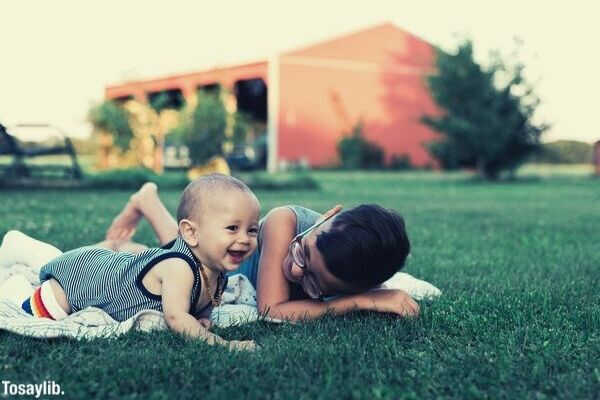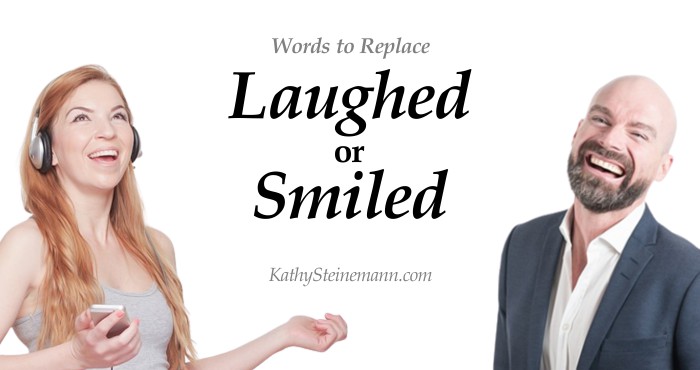

20 Examples of Words to Describe a Laughter in Different Scenarios
By: Author Hiuyan Lam
Posted on Last updated: October 20, 2023
Categories Vocabulary Boosters

There is no one type of laughter, and the various types give an indication of how a person is feeling. Therefore, different words to describe laughter are needed to distinguish them.
Some types of laughter show happiness or excitement, while others express sadness, or are evil. In this post, we’ll equip you with 20 of the best words to describe laughter in different scenarios.
Let’s take a look at them with some examples of how they can be used:
5 of the best words to describe an excited/happy (loud) laughter
When people are excited or happy, they tend to express that emotion through smiling, and in some cases, laughter. If you wish to describe this, use any of these 5 words to describe laughter:

3 of the best words to describe an evil laughter
Try to recall your favorite superhero, and the villains he/she chases. Do you notice that they only laugh when they do bad things, and their laughter sounds different from regular law-abiding citizens? That’s what we call an evil laugh. Here are 3 words to describe laughter of this nature:
You May Also Like:
25 Words to Describe Your Pet Dogs

How to describe the laughters of children
The purest laughter in the world is that of a child. They have no care in the world and no stress so are able to enjoy life to the fullest extent. These are 3 of the best words to describe the laughter of children:

3 of the best words to describe a sad/crying laughter
While the natural reaction for most people is to cry in a sad situation, others laugh or do a combination of both. Here are 3 words to describe laughter in this situation:

20+ of the Best Words to Describe Night in a Story
3 of the best words to describe an embarrassing/nervous laughter
Some people laugh in nerve-wracking or embarrassing situations in an attempt to make the air around them less tense. They most likely are not having a good time and it is usually obvious to everyone around them. Here are some examples of words to describe laughter in embarrassing situations:

3 of the best words to describe a hysterical laughter
Have you ever met someone whose laugh made you want to burst out into laughter yourself? Whether it’s about the way it sounds or how they look while laughing, you just can’t help but join in! Here are 3 words to describe laughter that is hysterical:

Whether you are a writer, or someone who just needs words to describe laughter in everyday conversation, this list should give you enough words to cover any situation. Just make sure you use them in the appropriate circumstance or else you won’t get your point across properly.
KathySteinemann.com: Free Resources for Writers
Word lists, cheat sheets, and sometimes irreverent reviews of writing rules. kathy steinemann is the author of the writer's lexicon series..

Ways to Say “Laughed” or “Smiled”: A Word List for Writers

Do You Depend on Smiled or Laughed Too Often in Your Writing?
This post provides ninety-nine alternatives. Before studying them, though, consider the other possibilities available to you.
Rather than rely on direct phrases such as she snickered , try body language, weather, and surroundings to show the happiness of your characters:
His eyes crinkled at the corners.
The glowing appreciation on her face shone brighter than the noonday sun. (Overstatement that might function for a character in love, perhaps.)
She hummed softly, a sparkle in her eyes.
Her voice grew bubbly.
He slapped the table and doubled over with mirth.
His shoulders shook so hard he peed himself.
Wilma spewed coffee down the front of Fred’s shirt. Hmm, he thought, I didn’t realize the joke was so funny.
Harry didn’t respond but held his sides as though he had a stomachache. I studied his face . The subtle upward quirk of his mouth told me he was smothering a laugh.
If you need additional beats, consult a body language dictionary . (As an Amazon Associate, I earn from qualifying purchases.)
Add Laughter With Dialogue
“Mwah ha ha.”
“That’s hilarious.”
“You’re a hoot.”
“I tell ya, Harry, that there gal looks like she done swallowed the entire Cheshire Cat.”
Capitalize on Clichés
Clichés have their place. Be careful, though. Not all pieces lend themselves to this type of writing:
He brought the house down.
She sent everyone into convulsions.
The audience rolled in the aisles.
The comedian’s barrel-of-laughs routine earned him a recurring gig at The Comedy Club.
Avoid acronyms such as LOL and ROFL unless you’re writing a piece that incorporates text messages or social media posts.
Instead of repeating the familiar and often mundane, invent a phrase. Idioms weren’t considered trite the first time they appeared. In each case, someone produced an imaginative phrase that appealed to the public. Over time, it joined the ranks of clichés shunned by authors and poets.
Who knows? Your turn of phrase could become as popular as He laughed all the way to the bank.
Get Down and Wordy
If your word count isn’t restricted, try making a person’s laugh a character trait in longer passages such as the following:
A smirk replaced his frown of suspicion, and then the room resounded with his distinctive laugh akin to the heavy bellowing of a donkey before it reaches full bray. He jumped out of his chair and met me halfway across the office, where we thumped each other on the back .
The noise Penny made came from deep within her throat, reminiscent of a snorting pig — apropos for her snout nose and pink complexion.
You can’t wax poetic with every sentence you write. Too much fluff and you bore readers, or an editor might brand your writing with the dreaded purple prose label.
Verbs and Phrases to Replace Laughed or Smiled
If you’ve exhausted the alternatives, or economy of words is crucial , the following list could save you multiple trips to your thesaurus(es).
B babbled, bared one’s gums, barked, bayed, beamed, belly-laughed, bent in two, bent over, boomed, brayed, broke up, bubbled, burbled, bust a gut
C cachinnated, cackled, cawed, cheeped, chirped, chirred, chirruped, chittered, chortled, chuckled, clucked, convulsed, cooed, cracked a smile, cracked up, crooned, crowed
D to H dimpled, doubled up, fleered, flashed one’s teeth , forced a smile, fractured, giggled, grinned, guffawed, gurgled, hee-hawed, honked, hooted, horse-laughed, howled
J to R jeered, jiggled, joggled, joked, joshed, juddered, leered, lost control, lost it, made merry, neighed, nickered, peeped, purred, quaked, quavered, quivered, roared, rolled in the aisles, rolled on the floor, rumbled
S screeched, shook, showed one’s teeth, shrieked, simpered, smiled, smirked, snickered, sniggered, snorted, snuffled, split one’s sides, spluttered, squawked, squeaked, squealed
T to Y teased, tee-heed, thundered, tittered, trilled, trumpeted, tweeted, twinkled, twittered, vibrated, warbled, whickered, whinnied, whooped, yelped, yowled
Discover more from KathySteinemann.com: Free Resources for Writers
Subscribe to get the latest posts sent to your email.
Type your email…

15 thoughts on “ Ways to Say “Laughed” or “Smiled”: A Word List for Writers ”
I’m pretty sure i’ve never heard or seen the word “cachinnated”. It looks like a word i’d never use. I’d have to go way out of my way to use it. But my narrator is attracted to words exactly like this, so it could be worth an aside conversation just to get it in. My narrator doesn’t have to start this conversation, so it could be natural. It could add some color to more than one character. It’s this kind of exercise i’m looking for. Perhaps the root “cachinnate” fits the scene easier.
Agreed. Not every word is appropriate for every story, Stephen. “Cachinnate” came into use in 1824, and it produces about 61,000 results in a Google search. However, it’s a rare verb.
Thanks for popping by!
Dearest Ms Kathy, I really appreciate your articles..These docs helped me a lot I m from the Philippines & English is my second language
Praying for your continued success in your endeavors
Ester Garampil
Thanks, Ester.
All the best!
Dear Ms Kathy, I really appreciate your posts especially for me who is just starting to write. You are so generous..GOD bless you & your family
Ester Espina
Thanks, Ester. Have a great day of inspiration and productivity!
Thanks a lot..Im just beginning to write. These words will surely add more descriptions to my characters..
Thank you, Ester. Good luck with your writing journey!
This is a veritable treasure trove, Kathy. You should write a book.
Don’t know why that comment came through twice!
🙂 I’ll delete the first one.
Thanks, Tom. I already have a name for the book, and even more words for each list. Do you have any favorite words or phrases you’d like to see explored?
I hope you’re saving all this for a book. These are great posts!
Thanks, Katie. You must have read my mind!
Yes, I’m collecting for a book–with even longer lists.
Thanks for sharing. This is a wonderful post.
Heh heh. Thanks, Tess. Next week: two word lists for “Noisy” or “Loud”.
Comments are closed.
- Skip to main content
- Skip to primary sidebar

Writing Tips Oasis - A website dedicated to helping writers to write and publish books.
How to Describe Someone Laughing in a Story
By Brittany Kuhn

Are you writing a scene in which a character finds an incident hilariously funny? Learn how to describe someone laughing in a story using the following 10 great words below.
1. Guffawing
Forceful, energetic laughter.
“He found the joke so funny that his guffawing could be heard across the room.”
“She was bent over with laughter, guffawing so hard her whole body shook.”
How it Adds Description
Guffaw is the sound a person makes when they are laughing so hard that their body shakes. Use guffawing to show that a person’s laughter is so loud and full of joy that it fills the room. Guffawing is also good for describing a laugh that might encourage others to laugh because it is so loud and fun.
2. Chortling
A particularly happy or pleased laugh with an almost strangled sound.
“He chortled throughout the entire film, causing others to stare at him in annoyance.”
“‘What a great idea!’ she chortled sarcastically, ‘I bet everyone would love to do ten more hours of work.’”
As another sound word, chortle helps your reader hear the kind of laughter the character is creating. Chortle is also a good word to describe laughter that is particularly annoying or throaty and comes out in short notes; it almost sounds like the character is saying ‘chortle’ with their laughter.
3. Bursting
- To suddenly express a great emotion.
- To force open or out.
“She could help but burst with laughter when the poor cat fell off the open door; it was the funniest thing she’d seen all day.”
“The little boy couldn’t help it anymore and burst out laughing, tears streaming from his face.”
Describing a character as bursting with laughter shows that they were not expecting to laugh but did anyway. This way of describing laughter emphasizes more the reason for their laughter rather than the type of laughter they had.
- A loud sound similar to a howl .
- Very abundant or prominent.
“She couldn’t help but howl with laughter at such a crude joke.”
“His insults left the group of children howling with laughter at the bully’s expense.”
Howling is another good sound word to describe the sound of laughter. It suggests that whatever caused the laughter is either so funny or so extreme that the character’s laugh has come out sounding like a mating call of sorts, the same way a coyote or dog might howl to attract attention.
5. Chuckling
A quiet, gentle sound of suppressed merriment.
“I chuckled softly as I watched my little girl play with her dolls.”
“After the email went out, a quiet chuckling could be heard at various cubicles throughout the office.”
When people are only slightly amused, they usually chuckle , often with their hand in front of their mouths. It’s a type of laughter that’s barely more than a smile. Therefore, it is a good descriptive word to show what the character sounds like when they’re trying to keep their laugh quiet because they don’t want to be heard, like in a meeting or classroom.
6. Giggling
Short, quieter bubbles of laughter.
“The little girls were giggling uncontrollably throughout the entire movie.”
“I was so embarrassed that I couldn’t help but giggle ; otherwise, I might have cried.”
Giggle is another sound word to describe a type of laughter. Giggling usually often comes from a feeling of embarrassment or shame. It’s a very distinctive sound, almost like little bubbles originating from the back of the throat, so using giggle to describe how someone is laughing allows your reader to practically hear it for themselves.
- Loud or booming .
- With great power.
“He could be heard roaring with laughter from down the hallway.”
“The comedy was a success; the entire movie theater kept breaking into roaring laughter every five minutes or so.”
Like a lion roaring, roaring laughter suggests that the laughter is loud and deep. Use this to describe a belly laugh, or from someone with a deep voice laughing at something they truly found funny (instead of just laughing for the sake of it).
8. In stitches
- Sharp pain in the side.
- Feeling of overwhelming laughter .
“We were in stitches reminiscing about all the funny things we used to get up to at college.”
“Fox’s ridiculous laugh put us all in stitches because it was so silly; we couldn’t stop laughing, even if we tried.”
When someone is in stitches , they have been laughing for so long that they are physically in pain; the act of laughing has caused a stitch, or sharp pain, in their side. This is a good phrase to show that the character is enjoying themselves so much that they can’t stop laughing, no matter how hard they try.
9. Snickering
A deliberately quieted or stifled laugh.
“He couldn’t help but snicker at the ridiculous costume; she was going to be made fun of by everyone.”
“The joke was so horrible that we all snickered ; puns are the worst.”
A snicker is another soft laugh, like a giggle or a chuckle, but with more negative or mean undertones. People usually snicker at things they find ridiculous or pitiful, in a ‘it’s funny because it’s sad’ way. Using snicker will show your reader that the character doesn’t appreciate or respect whatever is causing them to laugh.
10. Cracking up
Laughing aloud rowdily.
“I smiled at the way my son used funny voices to make his little sister crack up .”
“The stand-up comedian had the audience cracking up with his jokes about his childhood.”
Much like bursting or in stitches , using crack up describes more the level of a person’s laughter rather than what it sounds like. Use crack up to show that your characters found whatever it is so funny that they are going to go crazy with joy. They almost can’t help but to laugh.

IMAGES
VIDEO